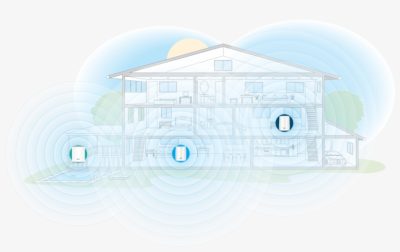As an Amazon Associate I earn from qualifying purchases.
In the age of smart homes and streaming wars, dependable Wi-Fi is no longer a luxury, it’s a necessity. But with so many options on the market, choosing the right router can feel like navigating a tech labyrinth. Traditional routers have long been the reigning king, but a new challenger has emerged: the Wi-Fi mesh system. So, which one should you choose? Don’t worry, we’re here to help untangle the web and guide you towards a seamless Wi-Fi experience.
Traditional Routers: The Familiar Friend
The trusty traditional router has served us well for years. It’s the familiar single unit that connects to your modem and blankets your home with Wi-Fi signals. Perfect for small apartments or studios, traditional routers work best in environments with minimal interference and a central location for the router.
Pros:
- Cost-effective: Traditional routers are typically more affordable than mesh systems.
- Simple setup: Plug it in, configure it, and you’re good to go.
- Compact design: Takes up minimal space.
Cons:
- Limited range: Struggle to cover large homes or homes with thick walls.
- Dead zones: Signal can falter in certain areas, leaving frustrating connection gaps.
- Single point of failure: If the router malfunctions, your entire network goes down.
Wi-Fi Mesh Systems: The Seamless Squad
Think of a mesh system as a team of Wi-Fi superheroes. Instead of a single router, you have multiple “nodes” strategically placed throughout your home, working together to create a blanket of seamless, consistent Wi-Fi. No more dead zones, no more buffering, just smooth streaming and lag-free gaming, even in the farthest corners of your house.
Pros:
- Wide coverage: Ideal for large homes, multi-story layouts, and homes with signal-obstructing obstacles.
- Eliminates dead zones: Consistent, reliable Wi-Fi throughout your entire home.
- Scalable: Add more nodes as your needs grow or your home expands.
- Self-healing network: If one node fails, the others pick up the slack, minimizing downtime.
Cons:
- Higher cost: Mesh systems can be pricier than traditional routers.
- More complex setup: Requires placing and configuring multiple nodes.
- Bulkier nodes: Can take up more space compared to a single router.
Picking Your Wi-Fi Warrior:
So, which one should you choose? It depends on your needs and budget. Here’s a quick breakdown:
- Traditional Router: Go for a traditional router if you have a small home, minimal dead zones, and prioritize affordability.
- Wi-Fi Mesh System: Opt for a mesh system if you have a large home, experience dead zones, value consistent coverage, and are willing to invest in a future-proof solution.
Bonus Tip: Consider your future needs. If you plan on adding more smart devices or expanding your home, a mesh system offers greater scalability and flexibility.
Ready to Upgrade Your Wi-Fi Game?
Now that you’re armed with the knowledge, it’s time to choose your ideal Wi-Fi solution. Head over to our top sellers page to check out some of our favorite traditional routers and mesh systems, hand-picked for different needs and budgets.
We’re confident you’ll find the perfect way to conquer your Wi-Fi woes and unlock the full potential of your connected home. Remember, a seamless Wi-Fi experience is just a click away!
Amazon and the Amazon logo are trademarks of Amazon.com, Inc, or its affiliates.


